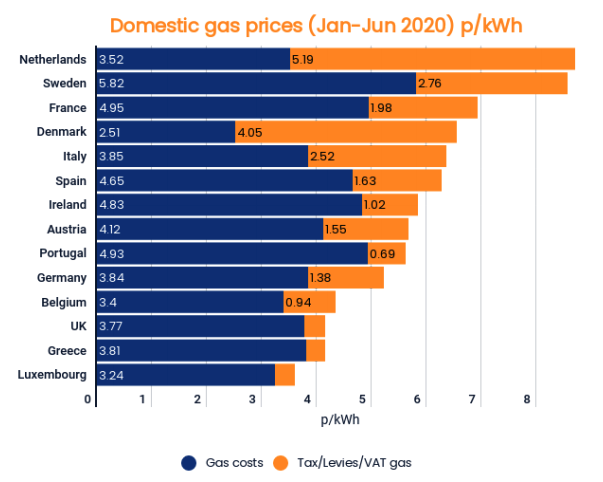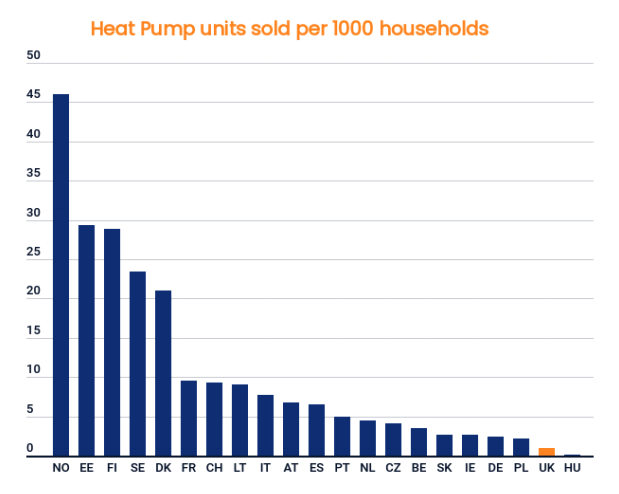
In the UK heating with fossil fuels is often the cheapest alternative. But how can we change that and make clean heating a more attractive option?
New piece for @GreenAllianceUK by me & @heatpolicyrich @RegAssistProj. THREAD greenallianceblog.org.uk/2021/09/16/reb…
New piece for @GreenAllianceUK by me & @heatpolicyrich @RegAssistProj. THREAD greenallianceblog.org.uk/2021/09/16/reb…
1) It is widely accepted that heat pumps will play a major role for decarbonising heating. But their running costs are usually higher than gas boilers. This is because we put most of the climate policy costs on electricity and almost none on fossil fuels. 

2) This issue is well-understood also thanks to the great work of the @CommonsEAC led by @Dunne4Ludlow. telegraph.co.uk/environment/20…
3) An obvious solution is to shift levies away from electricity. There are several options including shifting levies to fossil fuels, shifting the levies to general taxation perhaps combined with a modest carbon tax on fossil fuels or exempting the electricity used by heat pumps.
4) Option 1: Share levies based on carbon
Levies would be shared based on carbon intensity of fuels & encourage switch to increasingly clean power. NL already doing this: tax on fossil gas up to 43% higher by 2026 (compared to 2019 levels) & lower taxation on electricity.
Levies would be shared based on carbon intensity of fuels & encourage switch to increasingly clean power. NL already doing this: tax on fossil gas up to 43% higher by 2026 (compared to 2019 levels) & lower taxation on electricity.
5) Option 2: Move levies into general taxation
This approach would mean to pay for the levies on electricity via general taxation. It could be combined with a modest carbon tax on gas. This is effectively what Germany does. cleanenergywire.org/factsheets/ger…
This approach would mean to pay for the levies on electricity via general taxation. It could be combined with a modest carbon tax on gas. This is effectively what Germany does. cleanenergywire.org/factsheets/ger…
6) Option 3: Exempt electricity from levies and taxes used by heat pumps
Households installing a heat pump would receive a levy discount on the amount of electricity used for heating. Denmark has done this with the effective tax rate being 0.1p/kWh. ec.europa.eu/energy/sites/d…
Households installing a heat pump would receive a levy discount on the amount of electricity used for heating. Denmark has done this with the effective tax rate being 0.1p/kWh. ec.europa.eu/energy/sites/d…
7) All of these options exist in different variations in other countries and could be adapted for the UK context. @racheljanetwolf @publicfirst_pf led analysis published earlier this year calculating what it would mean for households and the Exchequer. publicfirst.co.uk/options-for-en…
8) There is support of and interest in levy reform from a range of businesses including @eonenergyuk @OVOEnergy @ScottishPower @centricaplc & @OctopusEnergy. Here is one example. eonenergy.com/business/news-…
9) Why is this issue so fundamental? As long as the running costs for clean heating are higher than fossil fuel alternatives government would have to provide huge subsidies to make economics stack up or regulate for less economic technologies. Both politically very difficult.
10) In the UK the taxes and levies on gas are particularly low. This results in one of the lowest heat pump installation rates in Europe. 



• • •
Missing some Tweet in this thread? You can try to
force a refresh





